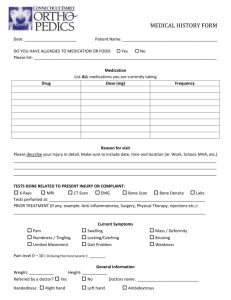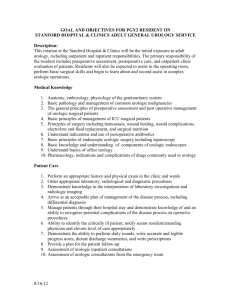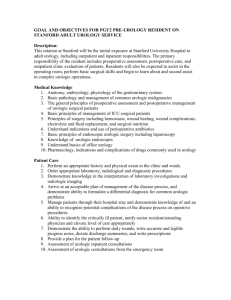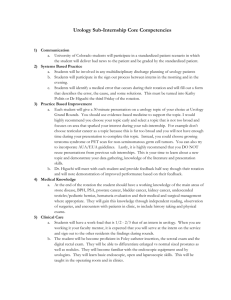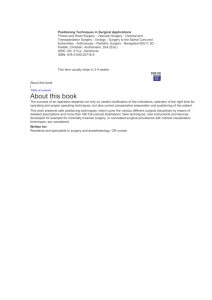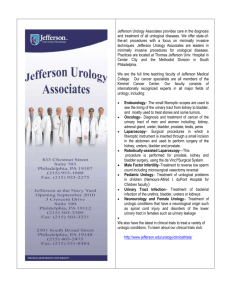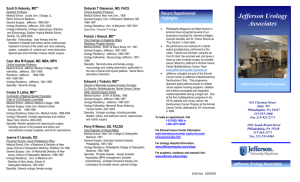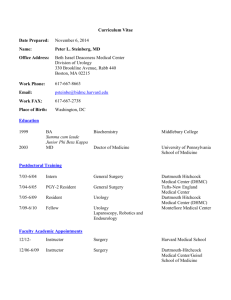comma gets a cure - Paul Meier Dialect Services
advertisement
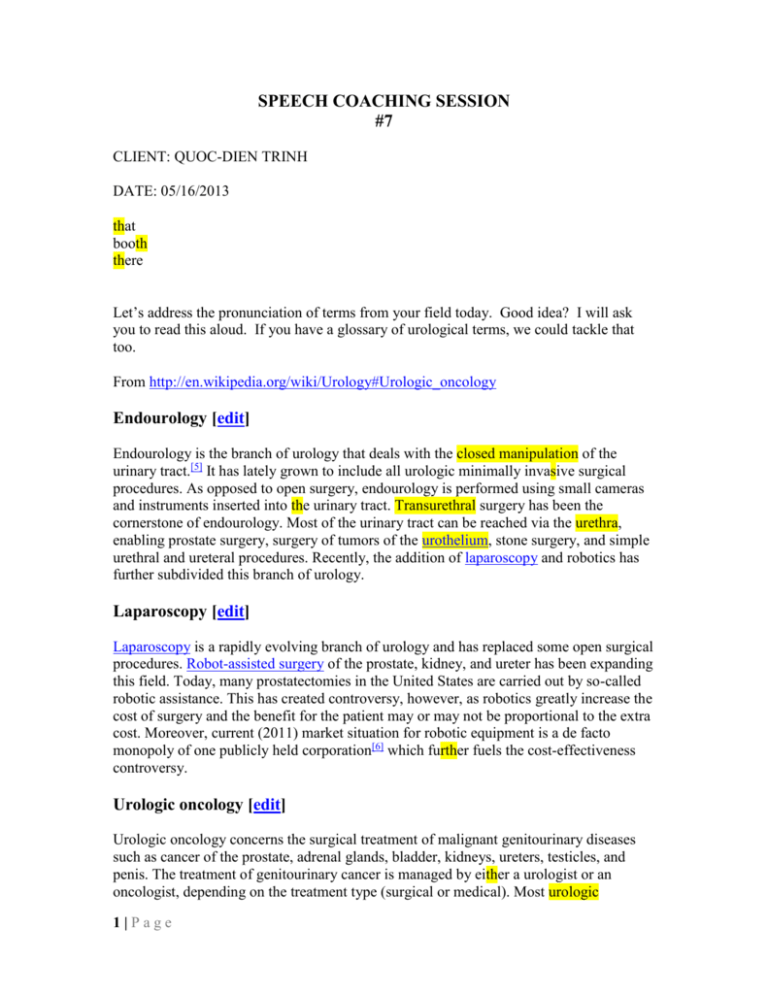
SPEECH COACHING SESSION #7 CLIENT: QUOC-DIEN TRINH DATE: 05/16/2013 that booth there Let’s address the pronunciation of terms from your field today. Good idea? I will ask you to read this aloud. If you have a glossary of urological terms, we could tackle that too. From http://en.wikipedia.org/wiki/Urology#Urologic_oncology Endourology [edit] Endourology is the branch of urology that deals with the closed manipulation of the urinary tract.[5] It has lately grown to include all urologic minimally invasive surgical procedures. As opposed to open surgery, endourology is performed using small cameras and instruments inserted into the urinary tract. Transurethral surgery has been the cornerstone of endourology. Most of the urinary tract can be reached via the urethra, enabling prostate surgery, surgery of tumors of the urothelium, stone surgery, and simple urethral and ureteral procedures. Recently, the addition of laparoscopy and robotics has further subdivided this branch of urology. Laparoscopy [edit] Laparoscopy is a rapidly evolving branch of urology and has replaced some open surgical procedures. Robot-assisted surgery of the prostate, kidney, and ureter has been expanding this field. Today, many prostatectomies in the United States are carried out by so-called robotic assistance. This has created controversy, however, as robotics greatly increase the cost of surgery and the benefit for the patient may or may not be proportional to the extra cost. Moreover, current (2011) market situation for robotic equipment is a de facto monopoly of one publicly held corporation[6] which further fuels the cost-effectiveness controversy. Urologic oncology [edit] Urologic oncology concerns the surgical treatment of malignant genitourinary diseases such as cancer of the prostate, adrenal glands, bladder, kidneys, ureters, testicles, and penis. The treatment of genitourinary cancer is managed by either a urologist or an oncologist, depending on the treatment type (surgical or medical). Most urologic 1|Page oncologists in western countries use minimally invasive techniques (laparoscopy or endourology, robotic-assisted surgery) to manage urologic cancers amenable to surgical management. Neuro-urology [edit] Neurourology concerns nervous system control of the genitourinary system, and of conditions causing abnormal urination. Neurological diseases and disorders such as a stroke, multiple sclerosis, Parkinson's disease, and spinal cord injury can disrupt the lower urinary tract and result in conditions such as urinary incontinence, detrusor overactivity, urinary retention, and detrusor sphincter dyssynergia. Urodynamic studies play an important diagnostic role in neurourology. Therapy for nervous system disorders includes clean intermittent self-catheterization of the bladder, anticholinergic drugs, injection of Botulinum toxin into the bladder wall and advanced and less commonly used therapies such as sacral neuromodulation. Less marked neurological abnormalities can cause urological disorders as well—for example, abnormalities of the sensory nervous system are thought by many researchers to play a role in disorders of painful or frequent urination (e.g. painful bladder syndrome also known as interstitial cystitis). Pediatric urology [edit] Pediatric urology concerns urologic disorders in children. Such disorders include cryptorchidism (undescended testes), congenital abnormalities of the genitourinary tract, enuresis, underdeveloped genitalia (due to delayed growth or delayed puberty, often an endocrinological problem), and vesico-ureteral reflux. Andrology [edit] Andrology focuses on the male reproductive system. It is mainly concerned with male infertility, erectile dysfunction and ejaculatory disorders. Since male sexuality is largely controlled by hormones, andrology overlaps with endocrinology. Surgery in this field includes fertilization procedures, vasectomy reversals, and the implantation of penile prostheses. Vasectomies may also be included here, although most urologists perform this procedure. Reconstructive urology [edit] Reconstructive urology is a highly specialized field of urology that restores both structure and function to the genito-urinary tract. Prostate procedures, full or partial hysterectomies, trauma (auto accidents, gunshot wounds, industrial accidents, straddle injuries, etc. ), disease, obstructions, blockages (e.g., urethral strictures), and occasionally, childbirth, can necessitate reconstructive surgery. The urinary bladder, ureters (the tubes that lead from the kidneys to the urinary bladder) and genitalia are other examples of reconstructive urology. Urogynecology [edit] 2|Page Urogynecology is a branch dealing with overactive bladder, pelvic organ prolapse, and urinary incontinence. Thorough knowledge of the female pelvic floor together with urodynamic skills are necessary to diagnose and treat these disorders. Depending on the cause of the individual problem, a medical or surgical treatment can be the solution. NOTES We modified the project. Instead of targeting RP, the goal is now good, clear, international English. Your English pronunciation is good. The only serious signature sound we found missing was /th/. Neither Vietnamese nor French contains the /th/ sound. For self-study, I suggest you practice lists of /th/ words, making sure you aren’t using /t/ or /d/, nor /s/ nor /z/. Avoid the involvement of either bottom or top lip by monitoring with a fingertip. Use low effort to hide any errors. Breathe into the sound, avoiding any plosive onset. You are better at medial and final /th/ than initial /th/. Let’s also work on one of your talks to identify other strategies for improving their clarity and vividness. Breath. Take a lot, use a lot. Enjoy the breath pauses Use high notes and low notes, but fully breath support them. Notice and EXPLOIT antitheses and lists A book on speech-writing and delivery? How about this one? Paul Meier Dialect Services www.paulmeier.com 3|Page
